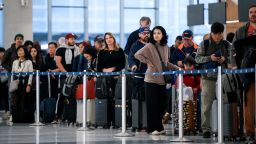UPDATE: Travelers across the United States are facing an urgent crisis this weekend as airlines cancel more than 1,700 flights amid severe air traffic controller staffing shortages due to a government shutdown. This disruption is set to affect travel plans from July 15 to 17, 2023, as delays mount and frustration grows among passengers.
This weekend’s flight cancellations are a direct result of a 4% reduction in domestic flights mandated by the Federal Aviation Administration (FAA). Airlines are scrambling to comply with the emergency order aimed at maintaining safety while air traffic controllers are absent due to unpaid work. As a result, the number of canceled flights has surged, with over 800 cancellations reported on Friday alone, and numbers expected to climb further.
“I just don’t want to be stranded at the airport sleeping on a bench,” said Michele Cuthbert from Columbus, Ohio, highlighting the emotional toll on travelers. This sentiment echoes through the airports, where many are left scrambling for alternatives.
If the government shutdown continues, airlines are poised to increase cancellations to 10% of their total flights by next Friday. Transportation Secretary Sean Duffy warned that if Congress does not resolve the deadlock soon, flight cuts could escalate to 15-20%.
Airlines are reacting swiftly. American Airlines will cut 220 flights from its Saturday schedule, and United Airlines has announced hundreds of cancellations through early next week, including 168 flights on Saturday and 269 on Tuesday. Southwest Airlines is also affected, with around 100 flights canceled on Saturday and 150 on Sunday to align with the FAA’s directive.
Travelers who wish to mitigate disruptions can take advantage of major airlines waiving change fees. Many are recommending booking backup tickets with alternate carriers to avoid potential stranding. Experts advise against booking flights with layovers and encourage direct reservations with airlines for the best chance of securing seats during this chaotic period.
Key airports are bearing the brunt of the shutdown’s impact. Washington, DC’s Reagan National Airport reported the highest level of cancellations on Friday, with nearly 80 flights affected. Other major airports, including Chicago O’Hare, Atlanta Hartsfield-Jackson, and Dallas-Fort Worth, are seeing significant delays and cancellations as well.
The ripple effects of this situation extend internationally, with major hubs like Amsterdam Schiphol and Tokyo Haneda reporting growing numbers of cancellations.
Travelers are encouraged to check flight statuses proactively, especially as airlines may not send timely alerts. If flights are canceled or delayed by more than three hours, passengers are entitled to full cash refunds.
As the government shutdown continues, the air travel landscape remains unpredictable. Stay tuned for real-time updates as this developing situation unfolds.







































































